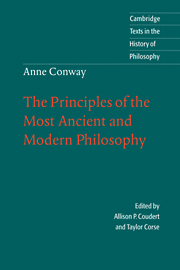Book contents
- Frontmatter
- Contents
- Acknowledgments
- Introduction
- Chronology
- Further reading
- Note on the text
- The Principles of the Most Ancient and Modern Philosophy
- Unpublished Preface by Henry More
- Published Preface
- Chapter I
- Chapter II
- Chapter III
- Chapter IV
- Chapter V
- Chapter VI
- Chapter VII
- Chapter VIII
- Chapter IX
- Index
- Cambridge Texts in the History of Philosophy
Chapter VII
Published online by Cambridge University Press: 18 November 2009
- Frontmatter
- Contents
- Acknowledgments
- Introduction
- Chronology
- Further reading
- Note on the text
- The Principles of the Most Ancient and Modern Philosophy
- Unpublished Preface by Henry More
- Published Preface
- Chapter I
- Chapter II
- Chapter III
- Chapter IV
- Chapter V
- Chapter VI
- Chapter VII
- Chapter VIII
- Chapter IX
- Index
- Cambridge Texts in the History of Philosophy
Summary
S. 1. Every body can change into a spirit and every spirit into a body because the distinction between body and spirit is only one of mode, not essence. One reason for this comes from the order of things mentioned above, which consists in only three things. Even the worst creatures, the most dreadful demons, become good after many and long torments and punishments. Furthermore, this crassness and hardness of bodies arose after a fall, and on this account they will return to a subtle and supple state. S. 2. Another reason for this comes from the divine attributes, some of which can be communicated to all his creatures. S. 3. A third reason comes from the love which spirits have for bodies. S. 4. To be penetrable and indivisible applies as much to bodies as to spirits, and to be impenetrable and divisible is equally applicable to spirits as to bodies. For this reason, the difference is only one of degree not of essence, and no creature or created spirit can be intimately present in any other creature because intimate presence pertains to God and Christ alone. Therefore, that philosophical penetration of bodies by created spirits is a pure fiction of the Scholastics.
In order to demonstrate this a bit more clearly, namely, that every body is a certain life or spirit in nature and has the principle of perception, having sense and thought, love, desire, joy, and grief insofar as it is affected in one way or another, and consequently, that every body has activity and motion in itself so that it can move itself wherever it wants to be, I claim that every body in its own nature, as it was originally created and will be once again, will return to its primordial state and be freed from that confusion and vanity to which it is subjected on account of sin.
- Type
- Chapter
- Information
- Publisher: Cambridge University PressPrint publication year: 1996

